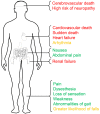Recent Progresses in Non-Dialysis Chronic Kidney Disease Patients with Hyperkalemia: Outcomes and Therapeutic Strategies
- PMID: 36837554
- PMCID: PMC9966910
- DOI: 10.3390/medicina59020353
Recent Progresses in Non-Dialysis Chronic Kidney Disease Patients with Hyperkalemia: Outcomes and Therapeutic Strategies
Abstract
Chronic kidney disease (CKD) affects about 10% of the world's population. Hyperkalemia is a life-threatening complication in patients with CKD, as it is associated with adverse cardiovascular and kidney outcomes. There are still many challenges and questions to address to improve the currently available therapeutic strategies to treat hyperkalemia, such as how to approach the emergency management of hyperkalemia. In recent years, in addition to novel oral potassium binders, great progress has been made in the application of novel kidney protective strategies, such as mineralocorticoid receptor antagonists and sodium-glucose cotransporter 2 inhibitors (SGLT2i) in hyperkalemia therapy. This review will discuss the recent advances from clinical trials in the effective management of hyperkalemia in non-dialysis CKD patients, enhancing the knowledge of physicians and internists concerning these newer agents and providing a helpful reference for clinical practice.
Keywords: chronic kidney disease; hyperkalemia; potassium.
Conflict of interest statement
The authors declare that they have no conflict of interest.
Figures


Similar articles
-
Non-steroidal mineralocorticoid antagonists and hyperkalemia monitoring in chronic kidney disease patients associated with type II diabetes: a narrative review.Postgrad Med. 2024 Mar;136(2):111-119. doi: 10.1080/00325481.2024.2316572. Epub 2024 Feb 16. Postgrad Med. 2024. PMID: 38344772 Review.
-
Hyperkalemia in Chronic Kidney Disease in the New Era of Kidney Protection Therapies.Drugs. 2021 Sep;81(13):1467-1489. doi: 10.1007/s40265-021-01555-5. Epub 2021 Jul 27. Drugs. 2021. PMID: 34313978 Review.
-
Potassium binders for chronic hyperkalaemia in people with chronic kidney disease.Cochrane Database Syst Rev. 2020 Jun 26;6(6):CD013165. doi: 10.1002/14651858.CD013165.pub2. Cochrane Database Syst Rev. 2020. PMID: 32588430 Free PMC article.
-
Mineralcorticoid receptor blockers in chronic kidney disease.Nefrologia (Engl Ed). 2021 May-Jun;41(3):258-275. doi: 10.1016/j.nefroe.2021.08.001. Epub 2021 Sep 1. Nefrologia (Engl Ed). 2021. PMID: 36166243 Review.
-
Novel Therapies in Diabetic Kidney Disease and Risk of Hyperkalemia: A Review of the Evidence From Clinical Trials.Am J Kidney Dis. 2023 Dec;82(6):737-742. doi: 10.1053/j.ajkd.2023.04.015. Epub 2023 Jul 29. Am J Kidney Dis. 2023. PMID: 37517546 Review.
Cited by
-
Management of hyperkalemia: Expert consensus from Kuwait - a Modified Delphi Approach.Int J Nephrol Renovasc Dis. 2024 Oct 5;17:227-240. doi: 10.2147/IJNRD.S476344. eCollection 2024. Int J Nephrol Renovasc Dis. 2024. PMID: 39386062 Free PMC article.
References
Publication types
MeSH terms
Substances
LinkOut - more resources
Full Text Sources
Medical

